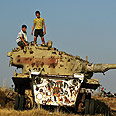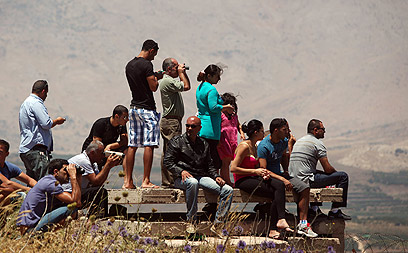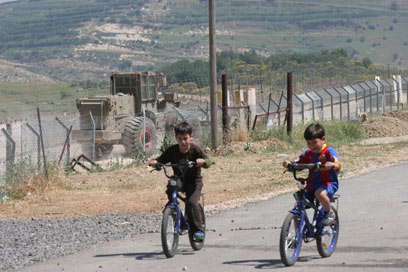
Syria fighting shatters unity of Druze in Golan
Raging civil war in Syria tears apart Druze community in Golan Heights as they face uncomfortable political choice – support or shun Assad?
Civil war in neighboring Syria is tearing apart the once tight-knit Druze community on the Golan Heights. Angry arguments between supporters and foes of Syrian President Bashar Assad have pitted husbands against wives, driven a wedge between neighbors and even threatened to ruin an upcoming wedding.
The two camps scrawl tit-for-tat graffiti on walls and run rival news websites. At a brawl last month, regime supporters pelted their rivals with eggs, shoes and rocks, prompting religious leaders to declare a ban on political demonstrations in the Golan's four Druze villages.
Related stories:
- Golan Druze start to turn against Syria's Assad Druze students return from Syria; say 'media exaggerating' Druze students in Syria: 'Send us back to Israel'
The growing divisions between those backing Assad and those sympathizing with Syrian rebels are surprising, considering the tight weave of the 22,000-strong Druze community on the Golan, a fenced-off plateau Israel captured from Syria in 1967 and annexed in 1981.
Since the capture by Israel, most of the Golan Druze – followers of a secretive offshoot of Islam – have continued to identify themselves as Syrian, even though many have never been to Syria, and in public at least they all backed Assad's regime as their one-day savior from Israeli rule.

Druze watch fighting across border (Photo: EPA)
However, some began questioning the Syrian dictator's actions as the regime violently cracked down on opponents. Activists estimate some 20,000 people have been killed in the past 18 months of fighting that has descended into civil war.
Others support the regime, fearing for the future of their sect in a rebellion lead by orthodox Muslims and worried Syria will collapse into chaos.
It's not clear how many residents now support the rebels, but backing for Assad has clearly eroded. Even some of the most fervent regime supporters are critical of Assad's rule.
Last month, simmering tensions erupted into violence. It began when several dozen rebel supporters demonstrated in Majdal Shams, the largest Druze village on the Golan.
Following the brawl, Druze leaders threatened to banish anyone showing public support for either side, fearing more serious violence, said Majdal Shams Mayor Dolan Abu Saleh. Religious authorities wouldn't comment. The mayor said two people were briefly expelled.

Border fence, near Majdal Shams (Photo: George Ginsberg)
The divisions even threaten to disrupt an upcoming wedding in Majdal Shams later this month.
Some 2,000 people are expected to attend, but members of the Abu Jabal clan fear the bride's father may refuse to come. Many in the large clan support the rebels. The bride's immediate family supports Assad's regime.
But the political battle continues, fought with graffiti scribbled on the walls of cinderblock homes spread over several hills.
"Bashar Assad" was scrawled on a concrete wall. The Arabic word for "may he fall" was smeared over, converting the anti-regime chant into a defiant fist-pump for the Syrian leader.
Online, the "Golan Times" cheers on the regime with articles like "Opposition member thinks of returning to Syria to get free medical treatment." On the website "Jawlan" – the Arabic name for the Golan – there's an essay on the plight of Syrian refugees in Jordan.
The Druze are spread across Israel, Lebanon and Syria. They survived in a turbulent region by showing allegiance to their country of residence, banning marriage outside the faith and shunning conversions.
Some 100,000 Druze in Israel are loyal to the Jewish state, while Lebanese Druze are important players in their country's politics. In Syria, Druze make up a tiny minority of some 3 percent in a country of 22 million and are marginal to the bloody power struggle there.
- Receive Ynetnews updates directly to your desktop










